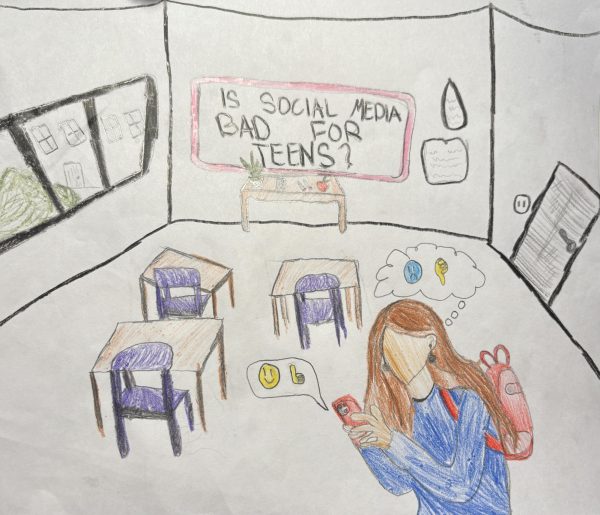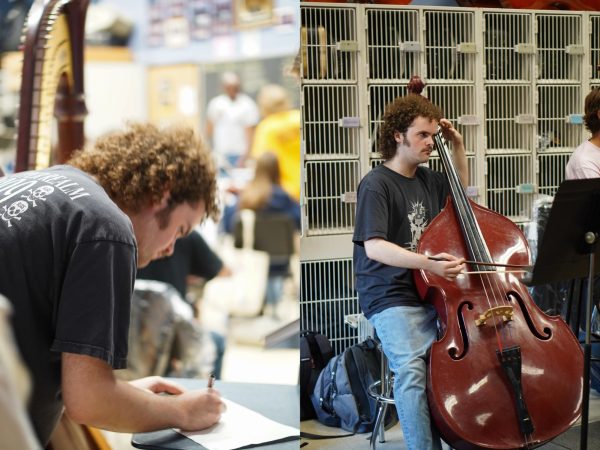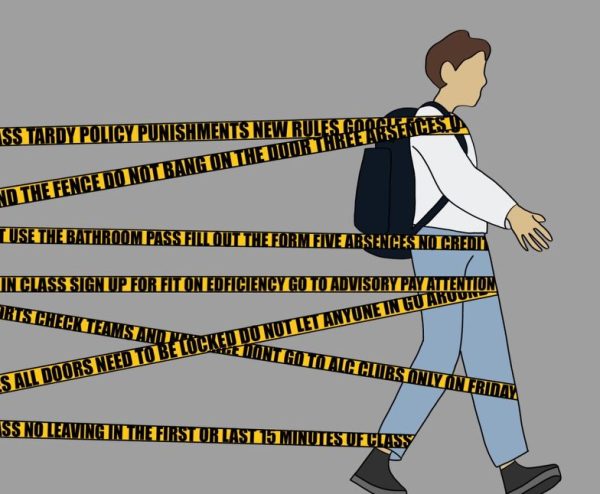Finally done with finals overload
How a finals-opt out policy could reduce stress and create a level playing field
Senior Charlotte Evelyn works on her homework for statistics, one of three AP classes she is currently taking. Under McCallum’s current system, Evelyn can exempt finals if she has a high average and takes the AP exam. A finals opt-out program, like the one at Austin High, would allow Evelyn to omit two finals if she has an 85 average and good attendance. Photo by Alysa Spiro.
February 26, 2020
Let me tell you something you might not know, but that will certainly affect your high school career if it hasn’t already.
At Austin High School, juniors are eligible to opt out of two of their finals and seniors can skip up to four. To qualify, students need an 85 average or higher, no more than three absences and no serious disciplinary actions. A student can only opt out of the fall or spring final for a course but not both. Students who waive their exam are given a make-up assignment and are expected to still be present during the exam period.
When I first heard about this opt-out program, I couldn’t help but have an emotional response, namely lust and desire. A final opt-out policy could make those four, dreadful days of test-taking so much more bearable.
Because of its success at Austin High, there is no reason to believe that it wouldn’t work just as well at McCallum.
What makes me drool over this policy is its ability to reduce stress, something I struggle with especially every time the end of a semester rolls around.
Eight classes, eight semesters of lessons, equates to a monstrous amount of material to memorize. A student can only spend so much time studying until eventually their brain feels numb, unable to grasp anything else.
By removing two or four semester finals, Austin High students are able to narrow the scope of subjects to study and dramatically reduce their workload. Their study time, focus and attention is consolidated into fewer classes. When more time is spent studying, test scores go up. Students are happy; teachers are happy.
Way too often, students are given finals that are either a near exact copy of a study guide or simply a long list of concepts to memorize. When students have fewer tests to prepare for, their time and attention can be much better spent by focusing on the more challenging tests, maybe the ones where their grade in the class is below an 85, instead of spending time reviewing for subjects on which they already have a solid grasp. With a finals opt-out policy, McCallum students would be able to excuse themselves from these tests, giving them a clearer line of focus and more time to dedicate to other subjects.
Furthermore, a finals opt-out policy provides positive incentive for students to keep good grades, attendance and behavior in their classes.
Right now, students with a high enough grade and the ability to shell out $94 for an AP test can waive their spring semester exam. This policy screams “pay to play.”
Nobody loves finals. For a lot of students, finals pose the nasty threat of severely dropping their semester average. If McCallum were to introduce a policy similar to Austin High’s, students would have a positive incentive to do well and work hard in their classes all semester long.
Higher grades and attendance and fewer behavioral issues doesn’t just promote a better learning environment for students, but it also makes teachers’ lives a whole lot easier. Once again, students are happy, teachers are happy.
Lastly, this policy would act as an equalizer between students who can and cannot pay for the pricey AP test.
Right now, students with a high enough grade and the ability to shell out $94 for an AP test can waive their spring semester exam. This policy screams “pay to play.”
Let’s do some math. Two AP tests cost $188. Four AP tests cost $376. $376 is a lot of money to anyone. And, for many juniors and seniors taking AP electives, the price increases even more rapidly.
Yes, McCallum is quick to claim that it has a scholarship program for students who can’t afford AP tests. However, these scholarships are only given to students on the free or reduced lunch program. Everyone else, despite their financial circumstances, are left in the dark.
Many students are in a sort of in-between zone. They can afford their own lunches, but spending $94 on a single test is a major financial burden. Spending upwards of $376 on a handful of tests is, for many students, financially impossible.
On the other hand, this policy encourages wealthier students to sign up for AP tests simply because it allows them to get out of a few finals. Instead of being seen as a way to get college credit, the cost of the test is the price they are willing to pay to experience a little less stress at the end of the semester.
A final opt-out policy creates a level playing field. Students who can’t afford to spend nearly $100 on an AP test will no longer be at a disadvantage to students whose families are willing to pay the price.
This entire discussion begs a bigger question: do finals do more harm than good? Is it fair to expect students to re-learn an entire semester’s worth of material within a week, only to be printed on a test and never seen again? Are finals more of an analysis of how well a student understands information or how good of a test-taker they are? Do finals promote unhealthy habits such as under-sleeping, cheating or even substance abuse?
However you answer these questions, a finals opt-out policy is step in the right direction. Because of its success at Austin High, there is no reason to believe that it wouldn’t work just as well at McCallum. In fact, who actually benefits from not installing this program at McCallum? Certainly not the stressed-out students, grading-overloaded teachers, or really, the school as a whole.
















Grace Vitale • Dec 3, 2020 at 10:21 am
I genuinely love this article so much and I think it was really well-written. I think it would be a great idea for McCallum to introduce a finals opt-out policy similar to Austin High School’s. Students at McCallum already have large amounts of assignments each week as well as extracurricular activities, which has resulted in them experiencing significantly detrimental effects to their health. Finals make each semester that much more stressful, especially for students that are struggling in some of their classes. McCallum introducing a finals opt-out policy similar to Austin High’s would allow students at McCallum to spend more time studying for exams in classes that they might struggle with and the policy would dramatically decrease their workload when they are studying for finals.
Daniela Morrow • Feb 27, 2020 at 11:30 pm
Students are pushed to their breaking point every week with all of the homework assignments given, and not to mention the extracurricular activities which interfere with the time students have to work on their academic studies. For some students at McCallum, this can become unbearable and ruin their social life/sleep schedule. I think that letting students decide not to take one of their final exams is a great idea, which will reduce the stress level throughout Mac and help students focus on the subjects needed. Overall, I LOVED this story, and I think that this thought would change McCallum for the better.
Olivia Escalante • Feb 27, 2020 at 8:38 pm
I think this article was really good, and made a lot of great points. Teachers who don’t have t o take finals need to understand the stress overload, and that most kids can’t handle it. I think the finals opt out program would be really good for McCallum, if a student works hard enough to maintain above an 85 average then they should be able to study to their best ability in their other classes.